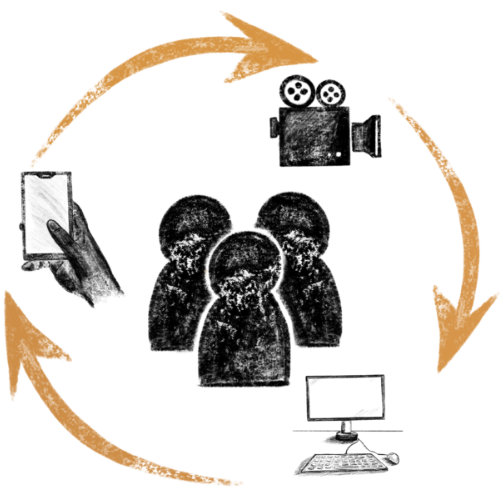Florian Mundhenke
The VR Documentary – History, Theory, Examples
While VR has now almost become established on the games market for home use by several large commercial manufacturers of displays and content providers, the use in the educational context is not yet very large. This applies in particular to artistic projects that, like documentary film, want to combine public education and creative expression. But especially at festivals that take place regularly (such as the DOK Neuland section of the Leipzig Documentary Film Festival), there are spaces to present innovative non-fictional projects – and the demand is not small, there are usually even waiting lists for use.
The lecture would like to approach this new form between creative practice, world building and interactive user integration in three parts: First, it will deal with the (recent) history of VR and ask about the essential factors in the implementation of current forms. Second, methods and theories are presented that emphasize the potential for innovation – also compared to linear documentary film or other digital forms like web docs – and I will outline the special nature of the form between experience, storytelling and participation. Third and lastly, of course, some examples should also be presented briefly, which have received a lot of encouragement from users and practitioners in recent years. These are selected in such a way that they describe as many different modalities of non-fictional VR as possible.
Florian Mundhenke, PD Dr. phil. habil., since 2020 Associate Professor for Cultural and Media Studies (DAAD) at the Institute for Modern Languages and Cultural Studies at University of Alberta in Edmonton/Canada. From 2018-2020 Temporary Professor (W3) for Media Studies and Media Culture at University of Leipzig. Before he was Senior Lecturer at the Institute for Media and Communication (IMK) at University of Hamburg, Associate Professor for Media Hybridity (“Juniorprofessor für Mediale Hybride”) at the University of Leipzig, and Research Assistant at University of Marburg. He was speaker of the DFG-funded research network “Cinema as an experience space”: www.erfahrungsraum-kino.de. PhD dissertation on the phenomenon of chance in film in 2008 (Marburg: Schueren). Habilitation (Lecture qualification thesis) on hybrid forms between documentary and fictional film in 2016 (Wiesbaden: Springer VS). Fields of research include intersections of arts and media in history and practice (intermedial, transcultural), non-fictional media (documentary film, VR films, i-docs, AR), methods and concepts of Digital Humanities in media studies, theories of media genres and genre development, intersectional media theory (gender, race, class, ideology), and world cinema with a focus on the Far East (Japan, Korea, Taiwan).
Florian Mundhenke
https://apps.ualberta.ca/directory/person/mundhenk
Email: mundhenk@ualberta.ca
